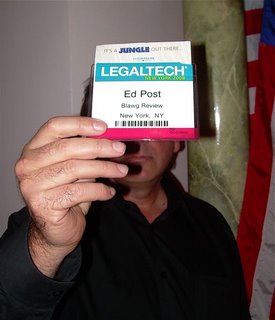For those looking to make a donation for Haitian earthquake relief, Consumer Reports has a round-up of reputable charities.
These are before and after pictures of the presidential palace:
January 13th, 2010
For those looking to make a donation for Haitian earthquake relief, Consumer Reports has a round-up of reputable charities.
These are before and after pictures of the presidential palace:
January 13th, 2010

Today I have a guest blogger that shows you how to save thousands of dollars a year. Those savings take place if you made the mistake of hiring FindLaw as your law firm’s marketing company (or are contemplating doing so).
The company hit my radar big time, of course, when FindLaw decided it would be fun to rip-off my blog name. A deeper look discussed how FindLaw‘s “Blogs” were tainting not only its clients, but its professor-commentators and the profession of law as a whole.
Today’s guest is a former sales rep that left on less than amicable terms because he couldn’t make an absurd sales quota selling a product that was so heavily over-priced. Today he has his own company. The financial analysis of FindLaw‘s offerings now follows:
——————————————————-
By James Eichenberger
(co-owner of Swell Sites, a small, Minnesota web design company)
There’s been a lot of chatter, mostly disgust, around the ethics and quality of FindLaw‘s blogs as well as what I’ll considerately call a lack of creativity in naming them. I’m sure that this, like the linking scandal of 2008*, will evoke a variety of reactions from people involved in the legal marketing community. The great majority of lawyers will read these posts and feel self-assured in the fact that they don’t do business with FindLaw.
However, I’m afraid that current FindLaw customers will have one of two reactions. Some will look at it as an issue that is isolated to the blogosphere, and therefore doesn’t effect them and their products with FindLaw. The second group will realize that, whether or not they have their names posted on these blogs, this is yet another incarnation of FindLaw‘s questionable ethics, and it’s time to move.
So the question for current FindLaw customers (the group that is willing to acknowledge that their reputations are at stake) becomes how do you transition out of your current site and retain some of what you’ve already paid for? To that end, I’ve put together a group of questions that can jump-start the idea that you can indeed rescue your website from being held hostage and save thousands of dollars a year.
1. What am I really getting from the FindLaw Directory?
In reviewing traffic reports with your sales rep or account manager, it’s common to see the traffic delivered by FindLaw rolled into one big number. To be clear, there are two distinct elements that bring traffic to your website from FindLaw. First, your FindLaw profile, (which will typically include “pview” in the URL on your traffic report) and then any directory placements, which can run from $30 to upwards of $1,000 per month. [Ed. note, FindLaw links coded as “nofollow” to avoid giving link juice.]
It’s important to understand the average price per click that you are paying for traffic from FindLaw‘s top listings. In many cases, those coveted clicks from FindLaw cost well beyond $100 each. Tracking how many of these clicks actually convert to contacts by following the pages they access on your site is a very easy task with many common (and free) traffic programs. It’s troubling that FindLaw‘s traffic reporting is unable to follow these users and show conversion for this extremely expensive traffic.
2. Why am I paying monthly for my website?
There are really two answers to this question, depending on where you are in the life of your website with FindLaw. FindLaw websites are billed monthly, so the idea is that they take the cost of a website and prorate it over 12 monthly payments. So if you are in the first 12 months of your contract, it can be argued that you are still paying for the creation of your website.
Outside of those 12 months is where the math gets blurry. The monthly rates don’t change (significantly, anyway) based on the length of the contract, and what you get in terms of content or SEO doesn’t really either. Unless you are engaged with your website to the point of calling to ask what you are eligible for on a quarterly basis, your website just gets more and more expensive the longer you keep it with FindLaw. A former FindLaw General Manager said on his way out (before having moved back over to West) that the best way to get real value from a FindLaw website is to buy one and then cancel it as soon as possible.
3. What do you get beyond the initial development of your site?
That’s a question that FindLaw was trying to answer the entire 5 years that I worked there, and to my knowledge, they still haven’t figured it out. If anyone reading this can tell me of an experience where they received real value outside of the initial development of a new project I’d be interested in hearing about it. My guess is that most FindLaw customers will struggle to recall ever being proactively helped with their sites. They will tell you about “refreshes” which are additional content opportunities, but they are not easy to set up or completely clear on who is eligible.
The service is supposed to include additional search engine optimization (SEO) work, but at the time I left, they could also just have someone from the SEO team “audit” the site, and then determine whether or not they wanted to work on it. Same thing with content; unless you ask about the schedule, and then give specific direction on what content you’d like written, you likely will not get any. I’d liken the whole situation to trying to write step by step instructions on how to tie a shoe. Tying a shoe is easy, but when you try to tell someone else how to do it, it becomes infinitely more difficult than if you had done it yourself.
4. What elements of my FindLaw website do I actually own?
Here’s where there is actually some good news for FindLaw clients. There are three basic elements to your site:
Domain Name
This is the the name that brings up your site. Regardless of whether you owned that domain name before you purchased your site, it IS yours. At any time, for any reason, you can request that the ownership of your domain name be transferred to an account under your name. That gives you the ability to keep a site up and running should you decide to move away from FindLaw in the future. It also protects you from them holding on to it should you get into any type of a dispute over your contract term, cancellation date or total amount owed to the company. Your domain name is the online version of the front door to your law firm…your law firm should be the sole owner and controller of that domain name.
Content
The content on your site that was “custom written” is yours to keep. Because you directed the writing of this content, and it was written about your firm, it is yours. The content includes the meta data which is a large part of their search engine placement strategy. Transferring your content, as well as the 3 or 4 lines of coding aimed at search engine placement, onto a new server space will typically yield the same, if not better, results on Google.
Not ALL of the content belongs to you. If you have any FAQs, eNewsletters, Practice pages or practice centers, those are actually leased from FindLaw. Re-publishing that content on to a new hosting space is a violation of the contract and licensing of the content.
Design
The design is owned by FindLaw, but can be purchased for a fee defined as 4% of the annual value of the website. So if you were paying $12,000 a year for your site, buying the design and all images used would typically cost about $500. For that cost, you get a disc or a link to download all of the HTML files and graphics that made up your site. What you get isn’t going to be easily rebuilt by a novice, but someone with a general knowledge of websites could reconstruct it in 2 to 6 hours, depending on the complexity of the design and number of pages.
5. How much should I expect to pay for a website from FindLaw?
There are hundreds of variations, but a template, 8 page site tends to run about $500 a month on a 12 month contract. So at a minimum, the site is about $6,000.* The second year monthly fees typically drop to about $350, so a 24 month stint with FindLaw with an 8 page website will cost right around $10,000.
This price increasing over time with the relatively low service level in the second year and beyond, is really where the opportunity to save some real money comes in to play. If you already have a FindLaw website, there are several ways to get it set up on your own hosting space. Attorneys who are very web savvy may be able to handle the migration themselves. If you are not very comfortable with web development it may be far more efficient to hire someone to do it for you.
6. How much does it cost to get my FindLaw site rebuilt on another platform?
There is no perfect answer for this, but you should expect to pay somewhere in the range between $1,000 and $4,000 depending on the size and complexity of your website. Whether you are setting up a new website or working to get your FindLaw site migrated, here are a few things you’re going to want to make sure have been taken care of (in no particular order):
a. XML Sitemap Submission
b. Traffic Reporting that shows where people are coming from (a counter is not enough)
c. Domain validation through Google (available in their Webmaster Tools)
d. Meta Data on each page of your site that you would like included on Google
e. Keyword rich content that reflects the approach and feel, not just the practice area, of your law firm.
I hope this information is helpful to people who are looking to gain a better understanding of exactly what they purchased from FindLaw, or looking to start up or advance their web marketing. I hope none of this came across as “axe-grinding” but at the same time, the reason that FindLaw can continue to get away with these other questionable projects is because there are thousands of lawyers who are paying thousands of dollars for what’s basically a trumped up web hosting plan.
——————————————————-
*Ed. notes:
1. For more info on the prior scandal with FindLaw selling links, see FindLaw gaming Google, and possibly scamming lawyer customers? Also see: Is the FindLaw Story Getting Distorted? where former FindLaw reps out the company’s disreputable policies in the comments.
2. This blog and my firm’s website were built by a small provider for a fraction of the cost of FindLaw’s services. The idea that lawyers would pay such ridiculously high rates to build a website, and then pay hundreds of dollars more per month to host it, is bizarre.
All the content on my two sites (for better or worse) comes off my keyboard.
January 12th, 2010
Last week, wordsmith extraordinaire Bryan Garner twitted this little gem of a quote:
“Some of the worst things ever written have been due to an avoidance of the ordinary word.” — Henry Bett
Fast forward to yesterday, and in the US Supreme Court, University of Michigan law professor Richard Friedman was arguing the Constitution’s Confontation Clause and used “orthogonal” to signify propositions that are extraneous or irrelevant to each other.
Don’t feel bad if you don’t know what the word means. Neither did justices Roberts or Scalia, and probably several others. Prof. Friedman was forced to explain, and thereby detracted from his argument. He sheepishly confessed, “That is a bit of professorship creeping in, I suppose.”
And that’s called being too smart by half, where there is such a desire to prove you’re smart that you lose your audience. And that’s just dumb.
A well-made argument, like a well-written brief, shouldn’t make make people work to figure it out. It should come easily and naturally, and lend itself to being received while having the feet up on the coffee table with a drink at hand.
More at Volokh from Orin Kerr, who has a transcript of the exchange, and who notes that the Supreme Court has never used the word “orthogonal” in a written opinion. Nor is it likely to, I might add, in my lifetime.
Update: Scott Greenfield also wrote about orthogonal this morning, with a contrary view:
Did it distract from his point? Sure, though the point that the argument he was challenging was tangential was hardly difficult to follow. Did it eat up time? Obviously, though not much. Did it break the tension, allow Friedman to relax as he moved forward and create an endearing moment that will enhance Friedman’s likability and hence credibility to all wings of the court. You bet.
Eugene Volokh seems to agree that use of orthogonal was a distraction.
—————————
Update – 1/25/10 – And the verdict is in: Orthogonal does not appear in the decision.
January 11th, 2010



Justice Robert Miller is not happy with the New York City Transit Authority. And when Justice Miller, one of the trial judges of Brooklyn’s Supreme Court, is not happy, that means a good bench-slapping.
As exquisitely detailed in this January 5 decision in Williams v. New York Transit Authority, the TA failed repeatedly over the course of three years to provide discovery from an Event Recorder Box (the train’s “black box”). The result is $15, 450 in costs and sanctions.
The suit concerns a 2005 accident when subway passenger Ronald Williams fell asleep on a train that subsequently entered a subway yard after the last public stop. He thereafter fell from a subway car and was struck and killed by a train.
Plaintiff’s counsel was asking, not unreasonably, for the accident reports and Event Recorder Box to get more details on what happened and why. After three years of trying to get that information, including a prior sanction against the Transit Authority for failing to properly respond ($250 that went unpaid), the court had had enough.
The decision catalogs conduct that appeared to supersede mere ineptitude on the part of the Transit Authority, which tried to assert that its conduct was not “wilful or malicious” nor that they have engaged in “a pattern of dilatory and obstructive conduct.” The court found, based on the overwhelming evidence, that the arguments weren’t made in good faith, writing that “If the actions were not wilful, they were inept and evinced a total disregard for the NYCTA’s discovery obligations…”
For those that like to see why our litigation system takes as long as it does, or is as expensive as it is, here is one more quote from the decision to add to the mix:
A review of the testimony establishes that if the NYCTA had exercised due diligence or any diligence, this entire discovery dispute could have been avoided and the vast expedition of time by the parties and the Court would have been saved.
Our municipal corporations have often been given more leeway by the courts than private litigators, as a panel of judges recently wrote in excoriating the City’s Corporation Counsel. (“[A]s a rule, our courts give far more leeway to the city than we typically do to other defendants in civil actions.”)
Perhaps, after so many years of problems, the courts are finally prepared to hold municipal parties to the same standards as the private parties.
And in case you were wondering what the court believes is a fair hourly fee for those of us that work on contingency and don’t generally track our hours, Justice Miller finds $350/hour for a partner and $250/hour for an associate.
January 11th, 2010

I hate doing this. But the anonymous Editor of Blawg Review, pictured at right, is asking those of us that have done reviews in the past to nominate the top reviews of the past year. I’ve now done three of them — based on the NYC Marathon (2007), Thanksgiving with Arlo Guthrie (2008), and The Bogeyman at Halloween (this year) — but asking someone to pick favorites from the past year is like asking you to pick 5 people to come to a party when you have 25 on your list. Yuck.
Anyway, this is what I think makes for a good review, and the way I make my selections:
1. Does the BR make me want to click on a link? If there is a long description of the linked post I don’t have to click. But a tease makes me want to click, along the lines of Above the Law’s Non-Sequiturs and Overlawyered‘s roundups.
The more times a BR sends me away to another blog, the higher marks it gets. Sending you away from its website is what made Google famous.
2. Does the review have a story? Stories make for fun and easy reading. I make opening statements that way as it helps the jury to keep pace with what is going on, and that is also why I like seeing reviews around a story.
3. Does the post have a long intro? I hate intros. Like jurors at a trial’s opening, I will never be more attentive than when the first words spill forth. Don’t lose me at hello.
4. Does the post have a legal theme? If it does, it gets generally negative marks from me, because it forces the writer to jam otherwise interesting posts into artificial categories. The themes I used were all non-legal; they were social gatherings where the conversation flows this way and that and can therefore accommodate any topic without odd segues and contortions.
Without further ado, the best of the year from my wholly subjective viewpoint:
Honorable mentions to:
OK, there you have it. I posted my utterly and completely subjective favorites based on rules I made up and then ignored, and now everyone that wasn’t mentioned hates me. Thanks, Ed.